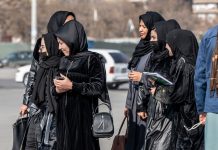The Taliban has implemented a new rule banning women from hearing other women’s voices as part of its ongoing efforts to restrict women’s rights in Afghanistan.
On October 28, the country’s minister for the promotion of virtue and prevention of vice announced this unusual restriction through a voice message.
While the specifics of the ruling remain unclear, Afghan human rights activists fear it may effectively prohibit women from conversing with one another. Minister Khalid Hanafi stated, “Even when an adult female is praying and another female walks by, she must not pray loudly enough for her to hear.”
He further questioned, “How could they be allowed to sing if they aren’t even permitted to hear each other’s voices while praying, let alone for anything else?” Hanafi mentioned that these are “new rules” that will be gradually enforced, claiming, “God will be helping us in each step we take.”
As the Taliban has banned the depiction of living beings on television, the announcement was made via voice recording instead of a TV broadcast.
One activist criticized the ruling, asking, “How are women, who are the sole providers for their families, supposed to buy bread, seek medical care, or simply exist if even their voices are forbidden?”
An Afghan woman in Kabul expressed to The Telegraph, “Whatever he says is a form of mental torture for us. Living in Afghanistan is incredibly painful for us as women. Afghanistan is forgotten, and that’s why they are suppressing us—they are torturing us daily.”
She added, “They say we cannot hear other women’s voices, and I do not understand where these views come from.”
Since seizing power in August 2021, the Taliban has systematically curtailed women’s rights in Afghanistan. Women have been mandated to cover their faces “to avoid temptation” and are prohibited from speaking in the presence of unfamiliar men who are not husbands or close relatives.
According to the rules approved by the Taliban’s supreme leader, “If it is necessary for women to leave their homes, they must cover their faces and voices from men” and be accompanied by a “male guardian.” Women are also instructed to avoid speaking loudly inside their homes to prevent their voices from being heard outside.
The Taliban has stated that women who violate these new rules will be arrested and imprisoned. The group’s supreme leader has even threatened to resume public stonings of women.
A former civil servant in Kabul told The Telegraph, “They [the Taliban] are waging an all-out war against us, and we have no one in the world to hear our voices. The world has abandoned us. They left us to the Taliban, and whatever happens to us now is a result of Western government policies.”
Another woman lamented, “I feel depressed. The world is advancing in technology and having fun with their lives, but here we cannot even hear each other’s voices.”
She added, “They want us not to exist at all, and there’s nothing we can do about it.” A woman from the western Herat province expressed concern that the ongoing oppression might lead some to take their own lives.
“They think ruling Afghanistan is only about suppressing women—we didn’t commit a crime by being born as women,” she said.
Below are some of the things the Taliban has stated Afghan women are not allowed to do:
1. Drive a car
2. Speak in public
3. Speak loudly inside your house
4. Travel alone
4. Own a smartphone
6. Wear bright clothes
7. Wear high-heels
8. Go to high school or university
9. Sing
10. Read the Quran aloud in public
11. Look at men they don’t know
12. Attend a protest
13. Go to the gym
14. Go to the park
15. Work in the civil service
16. Ride in a taxi
17. Go abroad
18. Show their faces in public
19. Speak to a male doctor
20. Play sport












